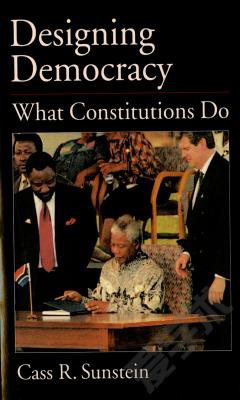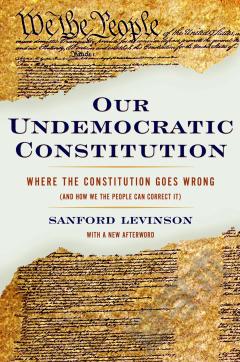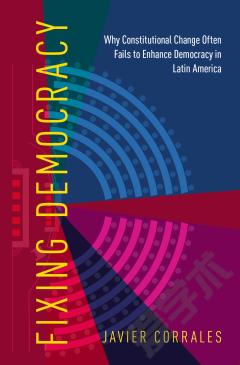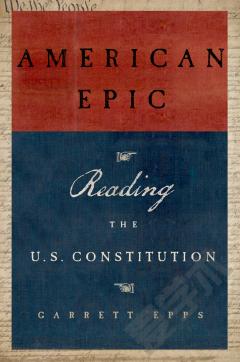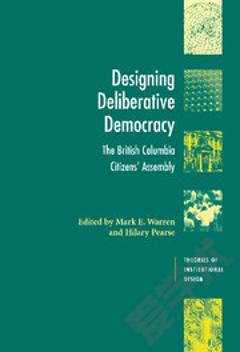Our Secret Constitution —— How Lincoln Redefined American Democracy
----- 我们的秘密宪法:林肯如何重新定义美国民主
ISBN: 9780195156287 出版年:2003 页码:305 Fletcher, George P Oxford University Press
This study points to the Civil War as the most significant event in American legal history. The basic principles of the postbellum legal order, believes the author, are so radically different from the Constitution of 1787 that they should be recognized as a second American Constitution, establishing a Second Republic. The first Constitution was based on the principles of peoplehood as a voluntary association, individual freedom, and a republican elitism. The guiding premises of the second Constitution - as articulated in Lincoln's visionary address at Gettysburg and enacted in the 13th, 14th, and 15th Amendments - were in contrast, organic nationhood, equality of all persons, and popular democracy. Thus, although we may yearn for continuity with 1787, in fact our values, commitments, and aspirations for America have radically changed. By finally recognizing our radical discontinuity with the first Republic, says Fletcher, we can put an end to debilitating arguments about the Founders' intent and consciously and energetically pursue the full implications of our true beliefs about what America should and can become.
very insiteful book about how lincolin changed the constitution in very possive ways and the out come of all that
Received "Our Secret Constitution, How Lincoln Redefined American Democracy" by George P. Fletcher in the mail today. This book is a huge disappointment. I usually stay away from books that praise Lincoln and the Lincoln Cult. Fletcher states, "I have benefited greatly from the works of our talented Civil War and Reconstruction historians. It is hard to match Eric Foner in mastery of the period and his passion for racial justice, or Garry Wills in his learned and imaginative style, or James McPherson in his ability to synthesize the grand moments of post bellum America." Fletcher is correct in that Lincoln created a "second constitution." But fails when he claims the second is far superior to the "first constitution." In truth the first protected "liberty at the expense of government," while Lincoln's constitution trashed liberty at the expense of We the People, and made slaves of all citizens. If you can't "leave," you ain't free!! Today Americans are prisoners of Lincoln's constitution and the huge bureaucratic centralized government that followed. To insure Lincoln's Constitution became the rule of law, Lincoln took up arms and murdered over 300,000 southerners. In the end Fletcher trashes the Southern Point of View and the Founding Father's Constitution. An amazing feat to accomplish both in one book. Fletcher's adoration and praise for Eric Foner in the Introduction makes this book suspect and downright useless for historical purposes. Claiming to view the war from a southern point of view Fletcher misleads many and guides most to the Lincoln Cult's point of view. Only the true Southerner will be able to see fact from fiction in this book. My opinion is Fletcher has written another Yankee revisionist version of the War for South Independence.
The author asks us to put aside our conventional assumptions and confront a 'subtle and unusual argument', that the Civil War called forth a new Constitutional order, in the Reconstruction Amendments. This new order is so radically different from that established in the original Constitution of 1787 that it amounts to a new Constitution altogether, a second American republic, dedicated to the proposition that all men are created equal. The book becomes then a fascinating discourse on Lincoln's Gettysburg address, in the incremental transformation created by the war from preserving the Union to abolishing slavery. The outcome is the passage from disguised elitism to the real birth of popular democracy in the redemptive experience of confronting the contradictions latent in the birth of the American nation. "...we resolve that these dead shall not have died in vain..."
He blew it in the title. Apparently, the author has no clue that we were never supposed to have a democracy. It was supposed to be a constitutional republic. "So, Mr. Franklin, what do we have, a repiblic or a democracy?" "A republic, ma'am--if we can keep it." Unfortunately, we have not.
American worship our constitution, and like many devotees, we'd rather have faith that we know the object of our devotion than explore the truth of our knowledge. So, many believe that the U.S. Constitution is a coherent idea, somehow preserved as first coined and ensuring freedom, equality, and justice. In George Fletcher's newest book, he tells the history of our constitution and demonstrates the importance of the U.S. Civil War, and particularly Lincoln's war rhetoric, in transforming both the constitution and the country. Its most compelling effect, Fletcher argues, was to transform the fundamental role of government from primarily securing freedom of the citizen to also promoting fairness and equality among citizens. The echoes of this transformation in the constitutional structures of the United States can be heard to this day in our arguments over religious tolerance, free speech, abortion, even the recent elections. There is much to contend with in this book, which in the spirit of full disclosure, this reviewer read in draft form. Some will find Fletcher's definition of "constitution" to be too broad. Some will find his notion of equality as a cardinal American virtue to be unworkable or improper, regardless of its historical pedigree. Some will disagree with Fletcher's historiography. None will be able fairly to reject his arguments without conceding their significance. Building, and in many cases greatly extending, the work of historians such as Eric Foner and constitutional scholars such as Bruce Ackerman, Fletcher, a Columbia Law Professor, has written a compelling and controversial argument.
Received "Our Secret Constitution, How Lincoln Redefined American Democracy" by George P. Fletcher in the mail today. This book is a huge disappointment. I usually stay away from books that praise Lincoln and the Lincoln Cult. Fletcher states, "I have benefited greatly from the works of our talented Civil War and Reconstruction historians. It is hard to match Eric Foner in mastery of the period and his passion for racial justice, or Garry Wills in his learned and imaginative style, or James McPherson in his ability to synthesize the grand moments of post bellum America."Fletcher is correct in that Lincoln created a "second constitution." But fails when he claims the second is far superior to the "first constitution." In truth the first protected "liberty at the expense of government," while Lincoln's constitution trashed liberty at the expense of We the People, and made slaves of all citizens. If you can't "leave," you ain't free!! Today Americans are prisoners of Lincoln's constitution and the huge bureaucratic centralized government that followed. To insure Lincoln's Constitution became the rule of law, Lincoln took up arms and murdered over 300,000 southerners.In the end Fletcher trashes the Southern Point of View and the Founding Father's Constitution. An amazing feat to accomplish both in one book. Fletcher's adoration and praise for Eric Foner in the Introduction makes this book suspect and downright useless for historical purposes.Claiming to view the war from a southern point of view Fletcher misleads many and guides most to the Lincoln Cult's point of view. Only the true Southerner will be able to see fact from fiction in this book. My opinion is Fletcher has written another Yankee revisionist version of the War for South Independence.
He blew it in the title. Apparently, the author has no clue that we were never supposed to have a democracy. It was supposed to be a constitutional republic. "So, Mr. Franklin, what do we have, a repiblic or a democracy?" "A republic, ma'am--if we can keep it." Unfortunately, we have not.
The author asks us to put aside our conventional assumptions and confront a 'subtle and unusual argument', that the Civil War called forth a new Constitutional order, in the Reconstruction Amendments. This new order is so radically different from that established in the original Constitution of 1787 that it amounts to a new Constitution altogether, a second American republic, dedicated to the proposition that all men are created equal. The book becomes then a fascinating discourse on Lincoln's Gettysburg address, in the incremental transformation created by the war from preserving the Union to abolishing slavery. The outcome is the passage from disguised elitism to the real birth of popular democracy in the redemptive experience of confronting the contradictions latent in the birth of the American nation."...we resolve that these dead shall not have died in vain..."
American worship our constitution, and like many devotees, we'd rather have faith that we know the object of our devotion than explore the truth of our knowledge. So, many believe that the U.S. Constitution is a coherent idea, somehow preserved as first coined and ensuring freedom, equality, and justice.In George Fletcher's newest book, he tells the history of our constitution and demonstrates the importance of the U.S. Civil War, and particularly Lincoln's war rhetoric, in transforming both the constitution and the country. Its most compelling effect, Fletcher argues, was to transform the fundamental role of government from primarily securing freedom of the citizen to also promoting fairness and equality among citizens. The echoes of this transformation in the constitutional structures of the United States can be heard to this day in our arguments over religious tolerance, free speech, abortion, even the recent elections.There is much to contend with in this book, which in the spirit of full disclosure, this reviewer read in draft form. Some will find Fletcher's definition of "constitution" to be too broad. Some will find his notion of equality as a cardinal American virtue to be unworkable or improper, regardless of its historical pedigree. Some will disagree with Fletcher's historiography. None will be able fairly to reject his arguments without conceding their significance.Building, and in many cases greatly extending, the work of historians such as Eric Foner and constitutional scholars such as Bruce Ackerman, Fletcher, a Columbia Law Professor, has written a compelling and controversial argument.

隐私声明 | 电子书 | 出版社
主办单位:中国教育图书进出口有限公司
京ICP备11007853号-12  京公网安备 11010802027623号
京公网安备 11010802027623号
Copyright ©爱学术平台 2021, All Rights Reserved











